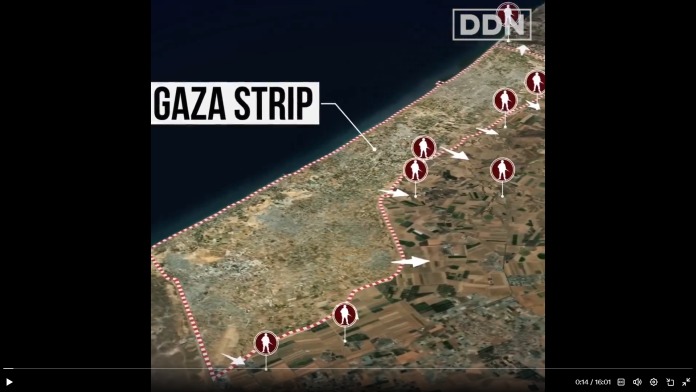The following is an exposure of what actually happened on October 7 in Israel, for those who prefer reality over lies and propaganda.
And also Max Blumenthal rips the cover off the media deceptions and atrocity hoaxes Israel pushed after October 7 to create political space for its gruesome assault on the Gaza Strip. Blumenthal exposes the US mainstream media’s role as a megaphone for the Israeli government, introducing new lies even after their initial ones were debunked. Atrocity Inc raises serious questions about the official narrative of October 7, while revealing how Israel’s army has consciously engaged in the same hideous atrocities which it falsely accused Palestinian militants of committing.
The Western media almost immediately sought a pro Zionist, pro Israel narrative, that distorted the actual reality. Over the last year the Western media have failed to represent a balanced and nuanced approach, leading many to take a position based upon misinformation.
The following are some of the examples of this:
Underreporting Palestinian Civilian Casualties: Some argue that the Western media downplayed the number of Palestinian civilian casualties in Gaza, particularly in the early days of Israel’s retaliatory airstrikes. Reports often focused on the Israeli victims of the Hamas attack, with less attention to the suffering of ordinary Palestinians affected by the military response.
Framing Israel’s Response as Self-Defence without Critique: Many critics believe that Israel’s military actions in Gaza were portrayed as purely defensive, with little questioning of the scale of the response. The Western media were accused of uncritically accepting Israel’s framing of the bombings as necessary for national security, while downplaying or ignoring the disproportionate impact on civilians.
Minimising or Ignoring the Siege of Gaza: Some accused the media of failing to properly address Israel’s long-standing blockade of Gaza, which has contributed to humanitarian crises in the territory. By omitting or minimising this context, media reports allegedly painted the conflict as a one-off event rather than part of a broader, ongoing issue of occupation and deprivation.
Silencing Palestinian Voices: Critics pointed out that Palestinian voices were underrepresented in Western media coverage. They claim the voices of those living under occupation, including those enduring bombings or mourning the loss of loved ones, were not given the same platform as Israeli voices, leading to an unbalanced narrative.
Equating Hamas with All Palestinians: Some argue that Western media often failed to make a clear distinction between Hamas and the broader Palestinian population. By focusing on Hamas’ actions, media coverage sometimes gave the impression that all Palestinians support the group, which critics argue is a distortion, as many Palestinians do not align with Hamas’ ideology or tactics.
Ignoring or Minimising Israeli Settler Violence: Some media reports were criticised for overlooking the role of Israeli settlers in violence against Palestinians in the West Bank. After the October 7 attack, there were reports of increased settler violence against Palestinian villages, but critics claim this was underreported or not given the same attention as violence involving Hamas or other Palestinian groups.
Lack of Coverage on Humanitarian Blockades: Western media have been accused of not adequately highlighting Israel’s restrictions on food, water, and medical supplies into Gaza. Some claim that by not addressing the impact of these blockades on Gaza’s civilian population, the media helped to sanitise the reality of the humanitarian disaster unfolding in the region.
Simplifying the Cause of the Conflict: Critics say that the Western media presented the conflict as a black-and-white situation, focusing on the attack by Hamas and Israel’s right to defend itself without providing deeper historical context. The portrayal often minimised or ignored the complex political, social, and economic issues driving the conflict, including decades of Israeli occupation, settlement expansion, and the conditions in Gaza.
Disproportionate Focus on Israeli Hostages: While the taking of Israeli hostages by Hamas was widely condemned, critics argue that Western media placed excessive focus on these hostages at the expense of reporting on the many Palestinian prisoners held in Israeli jails, some without trial or under administrative detention.
Framing Palestinian Resistance as Terrorism Only: While Hamas is a designated terrorist organisation, some argue that the Western media conflated all forms of Palestinian resistance with terrorism, ignoring legitimate grievances and non-violent protest movements. This created a narrative where Israel’s military actions were framed as entirely justified, with less exploration of why some Palestinians might resort to armed resistance.
Omission of International Criticism of Israel’s Actions: Although many international organisations, including human rights groups, criticised Israel’s response for being disproportionate and causing civilian harm, critics argue that such viewpoints were not adequately represented in Western media coverage, which tended to focus on Western government support for Israel’s right to self-defence.
Failure to Investigate Israeli Military Actions: Some media reports were accused of failing to properly investigate claims about Israel’s military tactics, such as allegations of war crimes or the targeting of civilian infrastructure in Gaza. These issues were sometimes dismissed or only briefly mentioned, leading to accusations that the media gave Israel a free pass on scrutiny.
The corporate legacy media – where truth goes to die.







